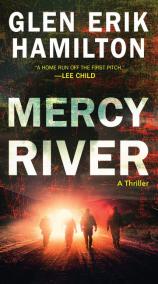Mercy River
Review
Mercy River
I am happy to report that Glen Erik Hamilton continues his win streak with MERCY RIVER, the fourth book in his Van Shaw series. Shaw is a former Army Ranger who combines his considerable combat skill set with the larcenous abilities that he acquired from his grandfather Dono, a well-known and somewhat benevolent criminal in the Seattle area who operated a quiet tavern as a legitimate business front. The novel exhibits a slightly different side of both Shaw and his creator, adding an interesting dimension to both.
MERCY RIVER is a bit of a slow boil at first, but things get moving rather quickly. The festivities begin when Shaw receives a mysterious and unexpected early morning call from Leo Pak, his superior officer in their Ranger platoon during their military tour in Afghanistan. Pak is obviously in distress and in trouble, a fact made more clear when a voice identifying the owner as a Mercy River police officer gets on the line. Shaw quickly learns that Mercy River is a small town in Oregon and that Pak is being held there, under arrest for the murder of a local resident named Erle Sharples.
"Hamilton, like his creation, walks the walk and talks the talk, which is worth the price of admission all by itself."
Shaw drops everything and makes the six-hour drive from Seattle to Mercy River to help his friend. The situation he encounters upon his arrival is by turns confusing and surreal. It develops that Sharples, a local gun dealer, had been employing Pak in his store. Pak really doesn’t seem to want the help that Shaw is bringing, including a high-priced Seattle defense attorney. The small town also is in the grip of a major annual event called The Rally, a large gathering of former and active-duty Army Rangers, which is both a social event and a means to raise money for a number of organizations benefiting Rangers and their families. It is the brainchild of a retired general who is benevolent as can be, at least on the surface.
However, Shaw soon discovers there are layers upon layers of secrets in Mercy River that intersect with Sharples’ murder, as well as a group of white supremacists who had set up camp in the town’s vicinity but had been chased out. It takes him some time to discover precisely what is going on, primarily because everyone, including Pak, is lying to him, though for different reasons. What Shaw discovers leads him from Mercy River to Seattle, where a dangerous plan erupts violently and causes him to retrace his steps to Mercy River, where the final truth is revealed and leads to a deadly denouement where ultimately very few will survive.
The ending is artistically satisfying for Hamilton and the reader, but is a mixed blessing for Shaw, who continues to find that life back in the civilian world is not what he expected it to be. MERCY RIVER is more than complete in itself, but some of the vignettes that occur may play themselves out further in future installments of the series. Hamilton, like his creation, walks the walk and talks the talk, which is worth the price of admission all by itself.
Reviewed by Joe Hartlaub on March 22, 2019




